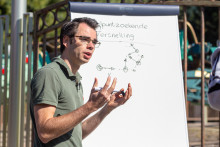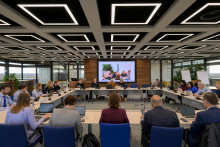In a University Council meeting at the beginning of July, the Executive Board listed a number of measures with which the UT wanted to save 30 million euros in the short term. One of those measures: an end to Student Jobs – Teaching Assistants and student on-call workers. The concrete details are still unclear a few months later. 'For the first quartile, a few things are still allowed, because there is not enough time to adjust our education. But from the second quartile onwards – as it stands now – nothing is allowed,' says Jurnan Schilder.
Loss of quality
The assistant professor calls this 'a huge problem' for the Mechanical Engineering programme. He is referring to the many hours of supervision during seminars and practicals that suddenly require a different solution. 'From other colleagues and PhDs, but that's a limited pool.' Schilder fears that this means that activities can only continue online. 'Either a reduction in the number of contact moments, or other solutions will follow that basically all come down to the same thing: loss of quality.'
Schilder outlines the scale of the upcoming problem with an example: Twente's Introduction to Mechanical Engineering (TIME). A course that consists of four lectures and four seminars. For the seminars, the programme always called on TAs. Twelve TAs are required per lecture, which results in a total of 48 slots. 'To keep a course of only 1EC running, I have to find 48 people willing to invest more than two hours of their time. You have to think about how much extra work we have to do as staff for a year of sixty EC. That shows how impossible it is to function without TAs.'
Team building
In the past period, Schilder made an appeal among all Mechanical Engineering colleagues. 'If they could please attend one seminar.' With a few days to go, it looks like the puzzle is going to fit. Schilder: 'Colleagues come from all over the organisation: lecturers, but also study advisors, lab technicians, education coordinators. We put our shoulders to the wheel together. There is charm in carrying out such an intro course together, a kind of team-building event for the organisation.'
'The dark side of austerity is that people seem to lose pleasure in their work'
Despite this solidarity, Schilder fears the long-term consequences for the programme. He also knows that he cannot call on colleagues endlessly. 'And not all colleagues want to participate, for example due to high work pressure. The dark side of austerity is that people seem to lose pleasure in their work, that they can no longer be motivated for such an activity with colleagues. Or simply don't have the time for it.'






